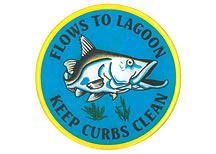- Home
- Departments
- Community Development
- Sustainability
- Pet Waste Management
Pet Waste Management
Pet Waste & the Environment
Pet waste can be catastrophic to the local waterways. Excess nutrients and organic matter in pet waste can cause algae blooms that block sunlight, kill underwater vegetation, and foul up the surface water. Decaying pet waste uses up oxygen in the water which can kill massive amounts of fish, oysters, and other aquatic species at once.
Pet waste enters our waterways in several ways:
- Directly disposing of pet waste in a pond, lake, canal, or the Indian River Lagoon.
- Rain washes pet waste down into stormdrains when it is left on an impervious surface; such as sidewalks, in gutters, or on streets.
- Pet waste can also be dissolved by rain, which allows the bacteria and other contaminants to flow freely into local waterways.
 Stormwater Drains
Stormwater Drains
The most common method pet waste enters our waterways is through stormwater drains. It is important to know that The City of Titusville’s stormwater drains:
- Do not receive any treatment before flowing directly into our local waters.
- Flow into the Indian River Lagoon and the St. Johns River
So whether intentional or not, it is important not to let pet waste enter our stormdrains by making sure to pick up after our pets. Also, pet waste is not a suitable fertilizer and may actually harm your lawn in large enough quantities.
Health Risks Possibly Associated with Pet Waste
Pet waste, just like human waste, contains numerous bacteria and viruses including fecal coliform bacteria. When left on the ground, pet waste negatively affects your health, your pet’s health, and the health of the environment-especially the Indian River Lagoon.
Pet waste carries parasites and diseases that can make water unsafe for swimming or drinking. Some examples of the infectious diseases carried by pest waste are:
- Campylobacteriosis
A bacterial infection that causes diarrhea in humans. - Salmonellosis
The most common bacterial infection transmitted to humans from animals. Symptoms include:- Diarrhea
- Fever
- Headache
- Muscle aches
- Vomiting
- Toxocariasis
Roundworms transmitted from animals to humans. Symptoms include:- Cough
- Fever
- Rash
- Vision loss
Flies and other pest insects can grow in population when pet waste is disposed of improperly. This not only creates a nuisance, but also adds another path for disease transmission.
Bag It! Trash It!
The Bag It! Trash It! program was created to increase awareness about the negative impacts of pet waste and encourage residents to pick up after their pets. The program makes waste disposal bags available to residents at conveniently located stations throughout the City and increases awareness of the impacts pet waste has on our environment.
- Bag stations have reduced unrecovered pet waste by an estimated 80%.
- Over 1,700 dispensers have been distributed under the Bag It! Trash It! program to date.
What Can I Do to Help?
- Bag pet waste and place it in the trash.
- Flush pet waste down the toilet, but please don’t flush bags or cat litter.
- Encourage other pet owners to be responsible for picking up after their pets.
The City of Titusville, in conjunction with Brevard County, the St. Johns River Water Management District (SJRWMD), the Florida Department of Environmental Protection (DEP) and the U.S. Environmental Protection Agency (EPA) have all spent significant resources studying and trying to improve the condition of the Indian River Lagoon. Do your part to make sure the City of Titusville continues to enjoy its beautiful, healthy, and diverse ecological resources.
Questions
If you have questions regarding other ways you can help keep our Lagoon free of pollutants, please contact the City of Titusville Sustainability Department at 321-567-3779 or email Abigail.Trout@Titusville.com